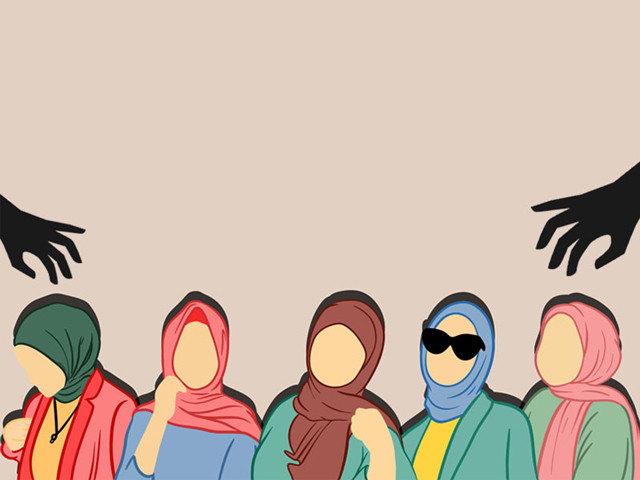A religion that grants women more freedom and rights than most has been wrongly used to colonise them for far too long
The non-dismissive and dogmatic spirit of poet Fahmida Riaz’s “Chadar aur chaar-diwari” has been haunting me since March 8th. Her, ‘bring this show to an end now Sire, cover it up now. Nor I, but you need this chadar now,’ shout relevance more than ever. Her deconstructive poetry became polemical against a dictator’s harmful portrayal of women’s bodies as the symbol of honour for the nation. Years later, the enduring relevance of her dismantling verses prompts a poignant question about the unchanged societal view of women in Pakistan.
Not long ago, a woman in Lahore narrowly escaped with her life as a charged mob called for her beheading. Fuelled by ignorance and purporting a religion that has called more for peace than anything, they demanded rectification. The woman later appeared on television, seeking forgiveness for wearing attire that wasn’t provocative in any way to begin with. It wasn’t revealing or morally offensive. The only shortcoming was that it had calligraphy over it that could be misinterpreted by those unable to read Arabic, ultimately leading them to mistakenly believe it’s a Quranic verse. She was presented as the culprit heavily covered with a large chadar, accepting blame for a crime that isn’t even listed.
And it’s not the first time that our religion and its masculine interpretation has been used as tools to subjugate women, demanding conformity to a cultural construct of honour. For years now, a sinister culturally driven interpretation has taken over our society, one that is far away from the essence of Islam. At the forefront of it all has been the not so gender-neutral blasphemy law.
Not long ago, human rights activist Gulalai Ismail was accused by 21-year-old Hamza Khan, who found her activism repulsive. Using social media, he called for her ‘elimination’ after accusing her of insulting religion. What followed was unprecedented – she fought back. Filing a case with FIA, she became a winning voice for those whose freedom of expression is silenced by the fear of being wrongfully accused in the name of religion. The same law was again weaponised during Aurat March, where many who disagreed with feminist street power felt threatened by women’s retaliation and used the blasphemy law as a tactic to frighten them.
But that’s not the end of it. The genesis goes even further back in history. For years now, such laws, under the guise of religion, have been used to reinforce existing gender orders, simultaneously punishing women who dare to disagree. The movement of women’s empowerment and women in general have seen darker days in this country. The contentious and undemocratic Hudood Law and it’s dark and unforgiving tentacles, serves as an enduring example of the challenges we have yet to fully overcome.
An adherence to a systemic and gender-driven exposition of Islam has been demanded from women for too long. A religion that grants women more freedom and rights than most has been wrongly used to colonise them for far too long. The threat to woman’s safety and their right to live is imminent. At stake is not just their liberty to express their views, but the collective consciousness of society. Because the direction of absolute intolerance and anger that we are headed in, under the guise of religion, is disastrous. Islam is a religion of persuasion and peace. Mob lynching over disagreement? Calling for elimination over difference of opinion? Inciting violence over insecurities? All of this in the name of a religion that preaches tolerance, benevolence, and forgiveness. No sane explanation exists for that.
The privilege I enjoy today, juxtaposed with slight sadness that nothing has changed, owes much to the voices raised by our feminist mothers. My hope is for a better and tolerant Pakistan, one where we don’t shy away from religious discourses, where we don’t abandon our religion for self-proclaimed master. Where we take the narrative back in our hands. We know Islam and it’s teaching bear no resemblance to the darkness unfolding in our country under its name. The conformity is not for religious reasons either. And it’s high time that we address that. Riaz eloquently wrote and I humbly quote,
“Sire, do be so kind. Do not give me this black chadar. I am not a sinner nor a criminal that I should stamp my forehead with its darkness.”


